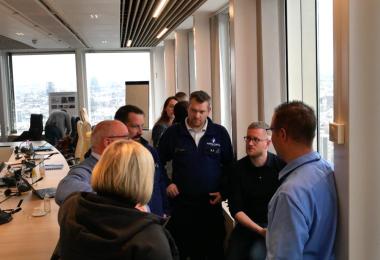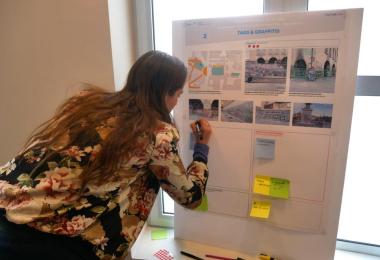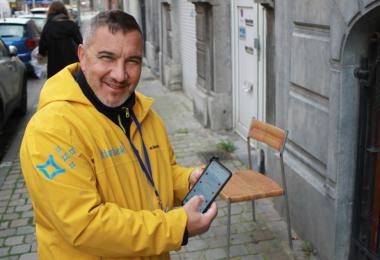2
Strengthen operational collaboration between institutional actors in charge of urban cleanliness
Measures
2. Establishing agreements between public urban cleanliness operators in order to clarify their roles and coordinate cleaning actions.
Establishing a system of agreements between the public operators involved in the cleaning and maintenance of roads and infrastructure in order to better clarify the roles and responsibilities of each and avoid grey areas. These agreements may relate to a variety of tasks, including cleaning in the broad sense of the term (cycle paths, green spaces, sites owned by STIB, etc.), the removal of graffiti, the maintenance of urban cleanliness infrastructure (litter bins, devices for collecting waste such as glass recycling containers, etc. or the management and cleaning of drains. The revision of these agreements will also be based on the work of the Public Zone Manager. The use of agreements includes the possibility for a municipality and Bruxelles-Propreté to entrust the cleaning of regional roads to the municipality.
3. Introducing a public zone manager in certain problematic urban areas, responsible for coordinating the actions of all public cleanliness actors involved.
Institutionalising the role of Public Zone Manager so as to implement actions for the management of emblematic zones which have been identified as problematic in terms of cleanliness: survey, coordination, identification of responsibilities, monitoring of the actions of the various actors (Bruxelles-Propreté, Brussels Mobility, STIB, municipalities, SNCB, Buildings Agency, etc.).
Brussels is characterised by a multitude of parties involved in managing and maintaining its public spaces. The fragmentation between the different competencies and areas of expertise of each party, even though legitimate, tends to complicate the daily management of certain areas, with repercussions for their state of cleanliness.
The clean.brussels strategy provides for the institutionalisation of a single operator whose role is to enable more cross-functionality and better coordination of the parties acting in a set area. This new method of governance favours the creation of co-constructed solutions to meet problems in the field. The PZM (Public Zone Manager) pilot project, initiated by Bruxelles-Propreté in 2021, aims to improve cleanliness in four areas* through better coordination of the parties involved and the subsequent monitoring of the implementation of their actions. The PZM’s role includes diagnostic work in the field, identification of any concrete problems to be solved, clarification of the responsibilities of the parties involved and of any grey areas, the organisation of working groups, the drafting of an action plan and the implementation of concrete actions on the ground.
*Gare du Midi, Mont des Arts, Flagey and Place Liedts


4. Improving the handling of complaints and requests for intervention by coordinating their management by the various players concerned, the response on the ground and the response to the initiator.
Improving the handling of complaints and requests for intervention received by Bruxelles-Propreté, involving key partners such as the Brussels municipalities, STIB, Brussels Environment and Brussels Mobility, with a view to optimising the response on the ground and communication with those who submit complaints or requests.
5. The municipalities propose their best public cleanliness projects and the Region provides them with financial support.
Supporting the municipalities of Brussels by launching a new call for projects from 2022 so that the actions of the main public actors involved in cleanliness reinforce one another through their consistency.
6. Using objective indicators of cleanliness problems in order to target problematic sites and define local objectives for improving cleanliness.
Expanding the use of objective urban cleanliness indicators in order to record lack of cleanliness ‘quantitatively’, identify problematic sites, define reduction targets according to waste type and measure changes in the level of cleanliness over time.
Each month, ‘objective cleanliness indicators’ (OCIs) are measured at around 15 sites in the municipality of Etterbeek. The OCI table, developed by the Association des Villes pour la Propreté Urbaine (AVPU), records the ‘quantitative’ state of uncleanliness at any given time. The person responsible counts, within a circumscribed area, a number of units (or concentrations) observed for each of the waste categories, qualified by their degree of severity. The OCIs thus constitute a tool for analysis and internal monitoring that can be used to identify the most significant contamination, and the categories of sites most impacted. This methodology makes it possible to measure developments in the municipality’s level of cleanliness, to arrange the different sites analysed in order of priority, and to guide the actions to be taken to make the streets cleaner.
An initiative of the municipality of Etterbeek.

7. Collecting and collating all statistical data on cleanliness problems in public spaces in order to assess the changing situation more accurately and prescribe the necessary actions (awareness-raising, cleaning, furniture or infrastructure, inspection and enforcement).
Analysing, listing and evaluating the public policies carried out in relation to urban cleanliness in terms of awareness-raising, cleaning activities, urban cleanliness infrastructure or sanctions for anti-social behaviour in public spaces. Looking into the possibility of identifying the statistical data that need to be produced, collected or extracted on the basis of a homogeneous model in order to ensure better use of statistics and organise the monitoring of evaluations better.
8. The Brussels Region is active in international urban cleanliness networks in order to draw inspiration from best practices, adopt them and promote its own initiatives.
Drawing inspiration from national and international practices by participating in meetings organised by associations and networks that are working actively on urban cleanliness issues, such as the Association des Villes pour la Propreté Urbaine (http://avpu.fr), ACR+ (https://acrplus.org), BeWapp (https://www.bewapp.be), Mooimakers (https://mooimakers.be) or Clean Europe Network (https://cleaneuropenetwork.eu) and, when appropriate, applying these practices in the Brussels-Capital Region. Adopting best practices should ensure that the Brussels Region performs well in the international rankings and is able to apply for international labels. Obtaining recognition of this kind will help promote the projects implemented by urban cleanliness actors in the Brussels Region.
